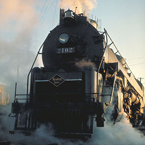Cyber-Nostalgia: Why the Web Still Weeps For Kozmo.com
I have a rudimentary method of looking at Ghost Sites' hit traffic, and I study these reports from time to time to see which sites incoming surfers are interested in viewing. While there appears to be a wide-ranging interest in many different kinds of dead Web sites, Kozmo.com turns up more frequently than just about every other site (with the possible exception of MarchFirst.com).
I'm not sure what it is about Kozmo that continues to fascinate people so many years after this brand departed, but I'm convinced that Kozmo has more active fans than those of any other corporate disaster with the possible exception of the Penn Central Railroad Company.
These suspicions were confirmed when I hopped over to E-Bay tonight and did a search for Kozmo-related "shwag" (otherwise known as throwaway promotional paraphenalia). More than 15 items showed up, about the same number that turned up the last time I did this, which was months ago. Over at Chromebags.com, you can pick up a mint condition PVC Kozmo bike bag for the not inconsderable sum of $60 (marked down from $90). Even hard to find items such as Kozmo scooters show up now and then on the Web - Craig's List Atlanta had one advertised as recently as this past March.
What other dead dot com continues to support such a robust posthumous market? Certainly not UrbanFetch, Kozmo's main competitor (I could only find one item, a used T-shirt selling for just $0.01).
What accounts for Kozmo's lasting popularity? In the overall scheme of the so-called "dotcom bubble", the company's rise and fall wasn't that significant. Is it just that the company manufactured so much promotional junk that it's taken people three years to unload it? Is it that people in New York and San Francisco formed lasting personal bonds with the Kozmo messengers who brought them their candy and VCR's back in the 1990's? Or that Kozmo's advertising campaigns, featuring 1970's icon Lee Majors, were weird enough to stick in people's minds for years?
I think that Kozmo.com best summarizes our recent, irretrievably lost decade of innocence because, for an all-too-brief, vanishing moment in time, convenience really was the main obsession in most urban American's lives. Not war, or terror, or the economy, or Condeleeza Rice, or Al Franken, or even the melting polar ice caps or growing ozone holes. For better or worse, the name "Kozmo" encapsulates our lost innocence more succinctly than any other name, and I'm starting to believe that historians of the 2100's may well refer to the 1990's as "The Age of Kozmo".
Stranger things have happened. I'm sure a lot of people who were alive in the 1920's who didn't listen to Jazz were shocked when this decade began to be referred to as "The Jazz Age". And being one of those unbelievably old people who were actually alive in 1967, I can tell you that I spent most of that summer riding horses and shooting tin cans with BB guns, so the label "Summer of Love" applied to that era has always seemed puzzling to me.
I don't know what historians will call our recent past, but I think they'll liken it to the Edwardian era that came just before the Great War (which is what they called World War One before World War Two happened).
Like the 1990's the Edwardian era was an excitingly giddy period of rapid technological change, its culture was whimsical (some would say fatuous), and its economic excesses and social inequities were enough to earn it the title of "The Gilded Age". One hardly need mention that each era met its end with the onset of a long and terrible war.
No historical parallel is perfect. But I firmly believe that a lot of people who never ordered a video from Kozmo secretly wish they had when they had the chance. Just so that they could have greeted Kozmo's cheerful bicycle messenger and given this panting, orange-clad fellow a friendly clap on the shoulder, standing together, protected from the abyss that was to come, trading small talk and laughing about being bright young people in a world where inconvenience was the greatest enemy, lateness the greatest terror, and lack of choice the greatest horror that modern life could ever know.
That world is gone forever. So close yet so far away - Kozmo - where are you when we need you?
Labels: Kozmo.com, Silicon Alley History



